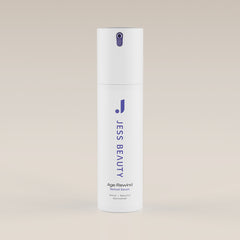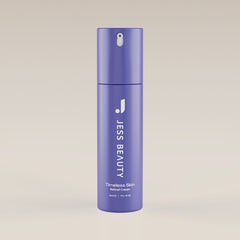Retinol has been a game-changer in the realm of skincare, known for its incredible power to revolutionize the skin and tackle a range of concerns, from acne to aging. But, as with any trendy ingredient, retinol has sparked its fair share of myths and misunderstandings.
In this Jess Beauty article, we will bust those common myths about retinol and arm you with accurate information to kickstart your amazing skincare journey and banish any doubts you may have.
Mythbusters, Jess Beauty edition: Unveiling the truth about retinol
Myth 1: You can’t use retinol if you have sensitive skin

This myth revolves around the initial side effects of retinol, like redness and peeling, which may give the impression that it's not suitable for sensitive skin. However, it's quite common to experience peeling and mild redness when using retinol, especially during the initial stages or what some call the "retinol adjustment period". The initial peeling and redness are common reactions as your skin adapts to the product, and steps can be taken to minimize discomfort during this phase.
Getting retinol to play nice with sensitive skin is all about strategy. If your skin is on the sensitive side, start with a lower concentration of retinol and ease into it gradually. By taking it step by step, your skin gets the chance to acclimate to the ingredient, minimizing the risk of any irritation popping up. And here's a pro tip: apply retinol at night and make sunscreen your day-to-day sidekick. This dynamic duo not only keeps your skin shielded from potential sun sensitivity but also ensures you're getting the most out of your retinol without the drama.
Remember, if you notice persistent redness, irritation, or peeling that's a bit too extra, it's always smart to loop in your dermatologist to ensure you're using the product correctly. They're the skincare superheroes who can fine-tune your routine and make sure you're on the path to skincare success.
Myth 2: Retinol thins the skin
There's a common misconception that retinol "thins" the skin, likely because of its exfoliating and cell turnover-promoting properties. However, let's set the record straight: when used properly, retinol works its magic in the opposite direction. Far from thinning the skin, it actually enhances its thickness and quality by kickstarting collagen production, resulting in an overall improvement in skin health and a noticeable reduction in fine lines and wrinkles.
Retinol’s wonders lie in its dual action: not only exfoliates the surface removing dead skin cells, but it also dives deep to stimulate collagen production in the underlying layers. Collagen, the superhero protein for skin thickness and elasticity, plays a vital role in achieving a firmer, healthier, and more youthful appearance.
So, if you're on a quest to tackle aging concerns or refine your skin texture, retinol is your skincare sidekick. Embrace its power to unveil a more resilient and radiant version of your skin. It's not a skin thinner – it's a skin transformer!
Myth 3: Retinol makes your skin more sensitive to the sun

The impact of retinol on sun sensitivity remains a hot topic with conflicting information circulating. Contrary to popular belief, retinol, a derivative of vitamin A, doesn't necessarily heighten the skin's susceptibility to sunburn and typically doesn't induce photosensitivity. However, exposure to light can break down retinol, leading to the formation of compounds that might have adverse effects. To play it safe, it's highly recommended to incorporate retinol into your nighttime skincare routine.
Begin by thoroughly cleansing your skin and then applying retinol, followed by a generous application of SPF protection before any sun exposure. It's worth noting that sunlight exposure can also degrade retinol, potentially reducing its effectiveness. To maintain the potency of your product, store it in opaque packaging and make it a part of your nighttime skincare ritual.
#JessBeautyTip: Sunscreen, your anti-aging sidekick
If you're incorporating retinol into your anti-aging routine, sunscreen is a crucial ally for maximizing its benefits Applying sunscreen the next day is non-negotiable to ensure optimal results and protect your skin. Remember, a youthful glow goes hand in hand with proper protection!
Myth 4: You can't use retinol with other skincare ingredients
This myth has gained traction mainly because, while renowned for its powerful skin-renewing properties, retinol can cause redness and peeling, especially during initial use. However, it's crucial to clarify that retinol can be effectively used with other products when done correctly. Proper usage and a gradual introduction help maximize the benefits while minimizing potential side effects. It's also essential to choose the right products when building up our skincare routine.
A perfect way to begin your skincare routine is by cleansing your face with a gentle product. Our Face Reset Cleanser, specially formulated with nourishing squalene and gentle coconut-derived ingredients, not only effectively purifies your skin but also leaves it feeling refreshed and velvety smooth, priming it to reap the benefits of retinol. Following cleansing, apply a moisturizer like our Post Workout Gel Mask, enriched with green tea, niacinamide, and centella asiatica, to create a protective shield and ensure a soothing experience.
Afterward, it's time to apply retinol: Apply a small amount of Jess Beauty’s Timeless Skin Retinol Cream to your face (excluding the eye area) and gently massage in upward motions. Subsequently, follow with a moisturizer and other serums, allowing retinol to work its magic while benefiting from the hydration and nourishment offered by the other products. You can start by using it 2 times a week in the evening before bed and gradually increase frequency as tolerated.
Myth 5: Retinol Is Only for Anti-Aging
While anti-aging care aims to preserve the skin's health and youthful appearance as we age, adopting a proper skincare routine early on is key to preventing future damage and maintaining skin vitality. Although it's renowned for its anti-aging properties, retinol's benefits extend far beyond this realm. This remarkably versatile ingredient is capable of addressing an array of skin concerns, like treating acne, diminishing hyperpigmentation, or enhancing overall skin texture, making it suitable for people of different age groups.
A few tips for optimal retinol use
Retinol operates by stimulating your skin's collagen and elastin production. When applied topically, it can penetrate the skin and reach the dermis, where it helps stimulate cell turnover, leading to a smoother, more youthful appearance. As mentioned earlier, it's quite common to experience peeling and mild redness when using retinol for the first time. That is why it's important to start with a low concentration of retinol and gradually increase the concentration over time. It's also recommended to use a good quality retinol product and to moisturize your skin before and after applying the product to help soothe any potential irritation.
Jess Beauty's Glow Guide: Retinol essentials for every stage
Catering to individuals at different stages of their skincare journey, we've crafted two retinol products. The Age Rewind Retinol Serum, an inclusive solution suitable for all skin types, that serves as the ideal starting point for those new to retinol, ensuring a gentle and gradual introduction to this powerhouse ingredient. On the flip side, the Timeless Skin Retinol Cream is thoughtfully formulated for those with prior retinol experience, delivering a potent solution for those seeking advanced results.
And here's a reminder: for a well-rounded skincare routine, don't overlook the importance of incorporating SPF protection.
Don’t forget that the power of a solid skincare routine lies in top-quality beauty products and unwavering consistency. Dive into the diverse array of thoughtfully crafted products on our Jess Beauty website, each meticulously designed to meet the highest quality standards and take your skincare rituals to new heights. Your path to healthy, radiant skin starts right here.
Should any uncertainties arise regarding the proper use of retinol, it's always wise to consult with a dermatologist before diving into a new skincare regimen.









